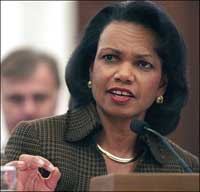Rice hoping to talk peace at Jerusalem summit despite political uncertainty
U.S. and Israeli dissatisfaction with a Palestinian power-sharing deal clouded talks on Monday among U.S. Secretary of State Condoleezza Rice, Israel's prime minister and the Palestinian president, but Washington's top diplomat said she wanted to inject some hope by addressing the outlines of a peace deal.

The meeting got off to a lackluster start that matched the low expectations that preceded it. Rice, Palestinian President Mahmoud Abbas and Israeli Prime Minister Ehud Olmert clasped their hands together and flashed polite smiles for the cameras in an unadorned hotel conference room.
The three met without any aides, except for Rice's Arabic interpreter, officials said. After about an hour, they moved to Rice's suite overlooking Jerusalem's Old City, giving them a more comfortable setting to work.
The broadbrush outlines of the power-sharing deal between the moderate Abbas' Fatah movement and Islamic Hamas militants who control the Palestinian parliament fall short of international conditions for acceptance and desperately-needed funding.
The international community has demanded that any Palestinian government recognize Israel, accept previous peace deals and renounce violence, but the coalition deal, forged earlier this month in Saudi Arabia, only pledges to "respect" past peace agreements.
Rice told U.S. journalists on Sunday night that Washington would "withhold judgment" on the coalition agreement until it was fleshed out. But she acknowledged that the outlines didn't meet the international conditions put forth by the Quartet of Mideast negotiators the U.S., European Union, U.N. and Russia.
"If there's going to be a Palestinian state, then the Quartet principles would obviously have to be recognized because ... this is the foundation for peace," she said.
"I haven't seen anything to date that suggests that this is a government that's going to meet the Quartet's principles, but you know...we will see once the government is formed," she said.
Abbas has said that this is the best deal he could wrest from Hamas, and that he would move ahead with forming a coalition. The power-sharing deal is seen as crucial to halting deadly Hamas-Fatah fighting that has killed dozens in recent months.
In talks with Rice on Sunday, Abbas portrayed the coalition accord as an achievement, saying it has helped moderate Hamas, whose charter calls for Israel's destruction. Abbas also emphasized that he, not the government, would handle any negotiations with Israel, his aides said.
Rice told journalists the U.S. would continue to work with Abbas "because he is committed to the road map and he's committed to the Quartet principles." But the Palestinian president is liable to be weakened if tethered to a coalition government that does not conform to the international conditions.
Olmert, who met separately with Rice on Sunday, said Israel would not deal with a government that doesn't recognize the Quartet principles. But on Monday, his spokeswoman, Miri Eisin, repeated the prime minister's position that Israel would continue to deal with Abbas directly.
She acknowledged that expectations of the summit had been lowered, but said the meeting was significant because Olmert and Abbas, who rarely speak face to face, were "sitting and having dialogue."
Olmert's own ability to maneuver is tenuous. After an inconclusive war last summer in Lebanon, Olmert's approval rating has plummeted below 20 percent, leaving him politically unable to carry out far-reaching concessions that would be needed for a peace accord with the Palestinians.
Rice said it was important for the summit participants to discuss the outlines of a Palestinian state and how to get there.
"I think it's a good thing to start exploring how we advance the two-state solution, a solution that will provide for the Palestinian people an independent state and provide for the Israeli people a neighbor that can help to bring them the security that they need and deserve," Rice said.
The basis for that solution is the long-stalled road map peace plan, backed by the U.S. and other international powers, Rice said.
The three-phase plan, which is to culminate in Palestinian statehood, never got off the ground because neither side met its initial obligations: The Palestinians were to dismantle armed groups and Israel were to remove West Bank settlement outposts, reports AP.
Rice told journalists that she did not expect things to move along quickly in times she described as "complicated" by the Palestinian coalition talks.
"I expect to have conversations that are at a pace to allow real discussion, and not to try to drive to some outcome, because if you ask people to run at this point, I think somebody is going to fall down, and that's probably not a good thing," she said.
Subscribe to Pravda.Ru Telegram channel, Facebook, RSS!




